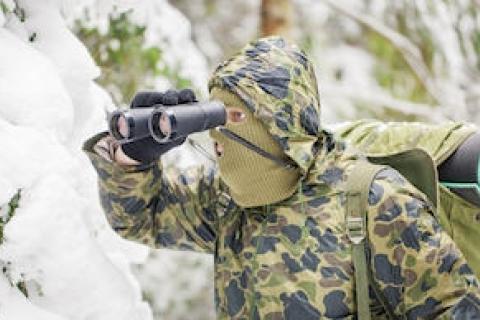
 Hypothermia – which often sets in when the body must endure wet, windy conditions in cold weather – occurs when one’s core body temperature is at 96 degrees F or below. The effects of hypothermia range from moderate to serious, including slowed bodily functions and death.
Hypothermia – which often sets in when the body must endure wet, windy conditions in cold weather – occurs when one’s core body temperature is at 96 degrees F or below. The effects of hypothermia range from moderate to serious, including slowed bodily functions and death.
For people regularly engaged in outdoor activities such as hunting, fishing or hiking during cold weather, awareness of hypothermia prevention, symptoms and treatment is of the highest importance.
For an overview of these points, read on:
Prevention
- Keep your body properly fueled. Drink ample water and consume nutrient- and energy-dense foods such as beef jerky, trail mix, nut butters and protein bars when venturing into the outdoors.
- Dress properly. Shield your body from the elements: Dress in with base layers that pull moisture from your body, and add layers on top of those that block the wind and protect from rain and snow.
- Know your limits. Listen to your body, take note of the signs of hypothermia listed below and respond even before your body has reached its limits. Take into account that the very young, those over 65 and those who are under the influences of substances such as drugs or alcohol are particularly susceptible to hypothermia.
- Seek shelter. Hypothermia can set in even in less-than-extreme temperatures as high as 40 degrees F. If the wind is cold and your body is wet – from sweat, rain, snow, etc. – it’s best to seek shelter.
- Be prepared. Always bring emergency items – First Aid Kit, emergency blanket, hand warmers, etc. – with you, even on short trips. Emergencies often come up when least expected, so be prepared for them.
Signs of Hypothermia
- Shivering. Involuntary shivering from mild to convulsive are symptoms.
- Confusion.
- Uncoordinated actions. Stumbling and slurring words are signs of hypothermia.
Treatment
If you notice signs of hypothermia in yourself or another, act immediately.
- If possible, warm up in a heated shelter. Move to a warm environment and remove wet clothing. Dress in dry clothing and sip on a warm beverage (nothing with caffeine or alcohol). Do some gentle exercises, such as walking, to create warmth.
- Otherwise, warm up as best you can in your sleeping bag. Retreat to a space out of the wind (preferably a tent or other structure) and remove wet clothing, replacing with dry items. Get into your sleeping bag, first filling it with loose gear to reduce air volume and allow for faster warming. Curl up, and share body heat with another person, if possible. Strategically place hand warmers on the neck, armpits and groin.

Source: Eastern Mountain Sports
Seek professional medical treatment. While the two options above are viable, medical professionals can treat hypothermia best. Immediately seek professional help, if possible.
For more helpful information on camping, hunting, fishing and other outdoor activities, please browse the array of blog posts available on the Bass Pro Shops 1Source website.
- 6264 views

